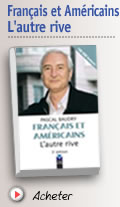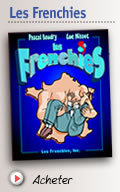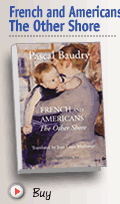![]()
The Washington Times - 2 Mars 2004
Vive la difference
A year ago, wartime friction with an old ally added "freedom fries" and "freedom toast" to patriotic menus, but America seems to have suppressed the anti-French fever that swept the country after Paris objected to U.S. plans to oust Iraqi dictator Saddam Hussein. The Franco-American feud still has not been forgotten in France, where books and articles in newspapers and magazines continue to analyze the disputes and disagreements between two nations that have been allies since the American Revolution.
One scholar has likened the relationship to a "lovers' quarrel." "The well-known lovers" quarrel between America and France, an "I Love You, Moi Non Plus" mixture of frustration and admiration, gratitude and annoyance, is now into its third century and still going strong, as France and the French clearly continue to inspire strong feelings in Americans," Edward Knox, professor of French at Middlebury College, wrote last year in an article for the French Politics, Culture & Society review. A French businessman who has lived in the United States for nearly 20 years offered his intercultural analysis in the book "Francais & Americains, L'Autre Rive" — which translates as "French and Americans, the Other Shore."
"The American first looks at the positive side of things. In a situation of potentially contradictory interests, he wonders if both protagonists can jointly win: the win-win," Pascal Baudry wrote in his book. "The French first look at the negative aspects of a situation he has to face: what is wrong in what the other person is saying or writing... what he wants from me, what I will lose." Mr. Baudry, director of a consulting company based in Berkeley, Calif., wrote that from a French point of view, the American win-win attitude may seem "ridiculously naive." As a consequence, Mr. Baudry said, although Americans usually view encounters with strangers as a way of mutual enrichment, the French consider strangers a threat. "The obvious absence of smile from the French in the presence of unknown people in public situations corresponds to this attitude. Everything happens as if a smile has a cost," Mr. Baudry wrote. "For the French, the smile of Americans looks — sublime reproach — as stereotyped, or even worse, 'commercial.' This last word is significant for what it implies: 'He smiles to me so he wants to sell something to me, and if he does so, necessarily it's in his interest and not in mine," he wrote.
Mr. Baudry believes the roots of these divergent attitudes begin in infancy. American children are weaned earlier than the French, he says, and as a result the French are more prone see the negative side. Americans, in contrast, are more inclined to consider matters through a positive mind, even if this can lead to envy. "Americans are on the side of envy and the French on the [side] of jealousy. ... The American mother, since she weaned quite vigorously the child very early, does too much for him, which provokes for the American the lasting anxiety of not being loved," Mr. Baudry wrote. For the Frenchman, the basic question is not whether he is loved. "The question will be: Am I able to be independent?" he wrote.
Mr. Baudry said American culture is explicit, while the French mean far more than what they say. "French was not during several centuries the language of European courts because it would be the most precise language, but because it is the language which allows [the speaker] to be the most precisely imprecise," he says. The relations between French and American citizens and institutions also contrast, Mr. Baudry said, again finding the root of the difference in early upbringing. The French, he says, see an institution as an authoritarian father and a possessive mother, while Americans wish to see an institution as a healthy parental couple. "In the United States, laws are made to be enforced, which always surprises the French... In France, the law is just a trick [that is] at the very most good for others," he wrote.
Time also is viewed differently in France and the United States, Mr. Baudry says: "Americans are mostly turned to the future and the present, while the French highlight more the past." The result, he says, is that Americans are optimistic and pragmatic, while the French are pessimistic and attached to their roots. Mr. Baudry noted former President George Bush's remark in his memoirs expressing surprise that French President Francois Mitterand always began their meetings with a historical explanation. "American kids are not interested in history, because they say it isn't used for anything. People are valuable according to what they can do now for you, and not according to their glory of yesteryear," Mr. Baudry says. It often has been suggested that Americans are indifferent to history because theirs is a relatively young nation, compared with European countries. Mr. Baudry disagrees. "I am sure that if we added 1,000 years to their history, it would not change anything," he says.
Despite their differences, the two nations will continue their historical relationship, Mr. Baudry says: "For more than half a century, the French culture has strongly been influenced by the American culture in a complex movement in which are mixed attraction and repulsion, love and hate."
Delphine Soulas


